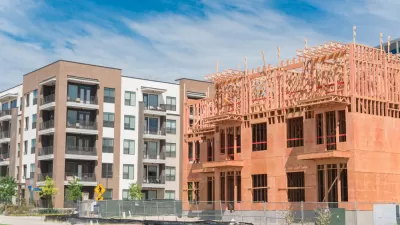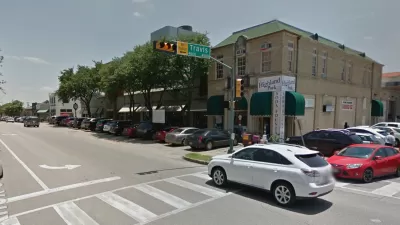Dallas has launched an effort to reform its "burdensome" parking policies, which have been left largely in the hands of local development districts.

In Dallas, a city where parking requirements have not changed in 60 years, city staffers have undertaken an effort to review and reform the city's parking regulations and overhaul its "byzantine permitting process," reports Peter Simek in D Magazine.
As cities around the country reckon with the legacy of parking requirements, planners are evaluating the effects of mandatory parking minimums—and policies that reduce them—on the urban fabric. "It is now clear that burdensome parking policies can drive up the cost of development, make it harder for new businesses to open and for developers to build affordable housing, incentivize the demolition of historic properties, and contribute to environmental dangers like the urban heat island effect." Oak Cliff City Councilman Chad West initiated the effort to reform Dallas-area parking last year, when, as chair of the Housing Committee, he "led something of a crusade to overhaul the city’s byzantine permitting process."
Andreea Urdea, a Romanian-born urban planner who trained and worked in Europe's compact, walkable cities, is leading the research arm of the project, which aims to reform Dallas's "lackadaisical approach to comprehensive planning" that has allowed zoning and land use regulations to be "continually adapted to fit the needs of every individual property owner," writes Simek. "Udrea’s job has been to research the parking rules, create local case studies that illustrate how those rules shape development, and examine ways other cities have reformed their approach to parking" in order to inform a future approach for Dallas. Udrea insists that her main task is to provide context. "Whatever approach Dallas takes to redrafting its parking regulations" she says, "will need to reflect an extensive community engagement process and be adopted by elected officials."
FULL STORY: She Came to Fix the Parking

Maui's Vacation Rental Debate Turns Ugly
Verbal attacks, misinformation campaigns and fistfights plague a high-stakes debate to convert thousands of vacation rentals into long-term housing.

Planetizen Federal Action Tracker
A weekly monitor of how Trump’s orders and actions are impacting planners and planning in America.

In Urban Planning, AI Prompting Could be the New Design Thinking
Creativity has long been key to great urban design. What if we see AI as our new creative partner?

King County Supportive Housing Program Offers Hope for Unhoused Residents
The county is taking a ‘Housing First’ approach that prioritizes getting people into housing, then offering wraparound supportive services.

Researchers Use AI to Get Clearer Picture of US Housing
Analysts are using artificial intelligence to supercharge their research by allowing them to comb through data faster. Though these AI tools can be error prone, they save time and housing researchers are optimistic about the future.

Making Shared Micromobility More Inclusive
Cities and shared mobility system operators can do more to include people with disabilities in planning and operations, per a new report.
Urban Design for Planners 1: Software Tools
This six-course series explores essential urban design concepts using open source software and equips planners with the tools they need to participate fully in the urban design process.
Planning for Universal Design
Learn the tools for implementing Universal Design in planning regulations.
planning NEXT
Appalachian Highlands Housing Partners
Mpact (founded as Rail~Volution)
City of Camden Redevelopment Agency
City of Astoria
City of Portland
City of Laramie





























